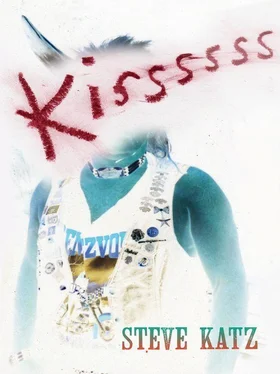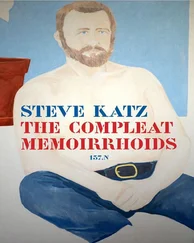“This one's yer wife?” Hilda has returned. “He's going to marry me.” She lets go of his arm. “After he divorces you.” She grabs the rum and 7UP Gordon set down by her hand. “Yiz from away, the two of yiz. That's perfectly goosy. That's goosy gander.” As she turns to leave she says, “But I'm gonna have the Colonel's money.” Alexander watches her stagger out to the verandah, flattening the back of her denim mini with her free hand.
“How about some wings?” Alexander asks his wife.
“Chicken wings?” Hilda watches her new rival on the verandah flirting with some young men in baseball caps. Not really a rival, she thinks; but it makes her feel too old to be at the Hoff.
Cameron Fitzgerald comes in the door with his fiddle case under his arm, as he does frequently on Thursday nights. He's pushing ninety but there is an echo of former jauntiness in his step. He often mistakes karaoke night for an old-fashioned ceilidh, an opportunity to screech his fiddle. He can play with some verve for an old guy, but has never made a sound anyone would voluntarily listen to. One could say he has lost it, but perhaps he never had it. Gordon signals to two of the regulars. They approach him, one taking his fiddle case, the other gently cradling his elbow. “Come, Cameron. Sit with us.”
Molly leans over Candy and Colin, and turns her red cap from an angle to the right, to an angle to the left. “Come on. Do something. Join in. It's fun. Sing a song.” On the stage Wren takes the mic to sing “Mustang Sally,” Wilson Pickett, her favorite.
“I'll sing as fuckin' soon as I'm fuckin' ready to sing. You go sing for yer fuckin' self.”
“She'll sing ‘Sixteen Tons.’”
“I'll sing twenty-seven tons. I'll sing as many fuckin' tons as I want to.”
Molly skips back to the stage, to join her partner. Wren taps on the mic. It's off. It is almost eleven, last call for wings. Elaina Brody, a pert pretty blonde, in a crepe mini, emerges from behind her booth and takes the microphone. Her karaoke begins officially after she sings her first song. The rest was all warm-up. She poses a moment with the mike, hips thrust provocatively to one side, and starts her evening with “Strawberry Wine,” a song about losing your innocence at seventeen. She has a throaty, mature voice, and carries the song like a backpack into the ghetto. The young men tipping bottles of Keith's and Blue down their throats look at her with some yearning, and all of them know it will take more than some sips of strawberry wine by the riverside to convince her to yield her innocence again.
Karaoke brings out the party in people, not just in Wren and Molly, who rise again to the stage to sing. Elaina has to tell them politely that she has a list, and the first on that list is one of the favorite local divas, Tessa Besoin, who usually sings “Beautiful,” the Christina Aguilera song, and Tessa is one of the most beautiful of the young women. Gordon puts down his towel, stops drying glasses to watch her. “Tessa! Tessa! Tessa!” people shout from all over the room. Her mother, who hardly ever goes to the Hoff, stands up to applaud with a chicken bone dangling like a cigarette from her lips. In her low-cut red dress, she reveals a lovely bosom of which she is proud. She looks down to make sure her cleavage is nicely visible, then applauds her daughter.
Kids crowd the verandah door to hear Tessa. Seeing her, though he hardly knows her, makes Jamie weep. He does know she is a great stepdancer, has seen her do it, and now she is studying ballet. He recently graduated in computer engineering, and has no idea if he will find a job or not. He doesn't get it, why he has these emotions. He would gladly have stayed and fished with his dad, but his dad recently sold off his lobster-fishing tags. Jamie always thought fishing lobster was something he could fall back on, instead of sitting in a cubicle and staring at a computer screen. The lobster will go the way of the cod, and the crab will soon go too. “What the fuck,” he wipes his eyes and listens to Tessa. “I'll get drunk.” He finishes his beer, and picks up the rum and Coke that has been left on the table near him. Maybe it belongs to someone who is dancing. The dance floor has started to fill up. He throws it down anyway.
While Tessa sings, Gordon comes out from back of the bar and skillfully nudges an incipient fight, between a Port Hood boyo and an Inverness boyo, out the door to the parking lot. Billy Crump smiles as he watches Gordon operate. He is almost always smiling. You have to smile if you spend your life with chickens. His wife will get here after the babysitter is settled. She likes to belt out a Dixie Chicks song, like “Wide Open Spaces,” or “Landslide,” though she often looks for something Canadian too, like Alanis Morissette, like Avril Lavigne, like Hank Snow, like Gordon Lightfoot or k.d. lang. She likes them a lot, but not to sing their songs herself. Anne Murray, even, who came from Cape Breton is always a possibility. She usually ends up singing Dixie Chicks, however. Maybe it's because they raise chickens, Billy chuckles. These are free-range chickens, broiler pullets that put on four pounds in seven weeks, three months ‘til market. He distributes to all the co-ops, to restaurants all over the island. Hundreds of chickens. When Billy closes his eyes all he sees is chickens, feathered and plump. Leonard Cohen! If Billy sang he would sing a Leonard Cohen song. “Bird on the Wire.” Billy doesn't sing, however.
Marilyn Goo-goo comes in the door alone, slipping by the altercation in the parking lot. She always comes alone from the rez, because she doesn't want to ask anyone to come with her. Since she moved back to the reservation after law school she occasionally has the urge to do what the white people do. She doesn't even enjoy this, but she has spent so much time with white people in school, in her sorority, in her first law firm, where she easily passed as Portuguese or Iranian, that she still occasionally needs a white fix. At school and with her law firm she went by the name of Marilyn Gehry, because she didn't want to have to explain Goo-goo, not that she was ashamed of it. She always thought that if she hadn't seen more of a need for lawyers among her people, she might have been an architect. She has never done a song, though she has a great voice. She thinks she can do something by Rita Coolidge. Billy Crump smiles at her as she orders a Moosehead from Gordon. She ignores him, not wanting to engage anyone in conversation. No one, she thinks, will ever call her a red apple.
“So this poor guy hanged himself from the bridge, middle of last winter. Middle of a snow storm.” Marvin Allen tells Emery this story he just heard from Tessa Besoin's mother, Crispi. He can't tell if Emery is listening. Emery is Wren's husband. He is concentrating on Wren as she runs around like a simpleton; in fact, he is shooting a video of her shenanigans. Maybe he will show it to her later, Marvin thinks, once she is sober. Emery is a recovering alcoholic, so he doesn't drink. He is also an artist, as is his wife, so perhaps this video will be part of a performance.
“He didn't know anything about hanging someone, so he used chicken wire around his neck. My friend said her dogs were going crazy for two days, and she didn't know why. The poor bozo was hanging there for two days before they found him.” Marvin thinks that perhaps Emery has nothing to say.
Wren and Molly are back at the mic, ready to sing Fats Domino's “Blueberry Hill,” when suddenly most of their audience rises and rushes to the window like flies to a smear of honey. The tension and macho display that has been slowly building, between the Port Hood and Inverness men, has finally erupted into a fistfight that goes full-blast now in the parking lot, two big males rolling across the blacktop, smashing each other. Their friends whistle, egg them on.
Читать дальше












